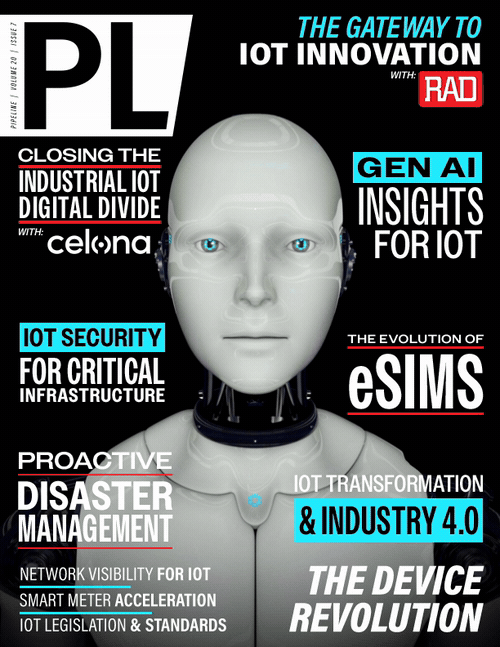Article Index for the July Issue:
July 2024 - IoT & Device Revolution
July 2024 - IoT & Device Revolution
Gateway to IoT Innovation:
The $10 Trillion IoT Opportunity
The Internet of Things (IoT) market is at a pivotal point. It constitutes a tremendous opportunity for network and service providers, with some market forecasters predicting a more than 300
percent increase in connected devices coming online between now and 2030. That equates to nearly 30 million devices and a $10 trillion market size encompassing many industry verticals. But the
question remains whether network service providers will seize the IoT opportunity to move up the value chain by providing more value and helping their customers transform…» read this article
The Industrial IoT Digital Divide
By: Rajeev Shah
» read this article
GenAI Insights for IoT
IoT technology produces many different streams of data. AI is very good at finding patterns in what otherwise appears to be unrelated data. Applying AI to oceans of IoT-generated data is likely to produce new and valuable insights. Although there are significant questions about how this can best be done for the general good, such an application of GenAI is likely to become part of the emerging GenAI-driven paradigm. Technology innovation follows a four-stage pattern: 1) denial; 2) implementation of the old paradigm with new technology; 3) emergence of a new paradigm, implementing the new technology in new ways; and 4) the next technology innovation…» read this article
Enhancing IoT Security in Critical Infrastructure
By: Andrea Carcano, Michael Dugent
» read this article
IoT, 5G, and Escaping the eSIM Crunch
By: Chris Jahr
» read this article
A Proactive Approach to Disaster Management
By: Rajesh Suseelan
» read this article
From Hardware to Holistic: The IoT
Revolution in Business
By: Ron Konezny
» read this article
Network Visibility Requirements for IoT -
and the Questions CSPs Need to Ask
By: Miguel Carames
» read this article
Smart Meters Account for 80 Percent of
Electricity Meters in North America
By: Johan Fagerberg
» read this article
Protecting IoT Devices and Users through
Legislation and Trusted Standards
Across the globe, Internet-of-Things (IoT) devices continue to underpin operations in most critical industries. The benefits these devices bring to businesses are invaluable, as is reflected in
their continued popularity. By 2027, over 29 billion connected devices are expected to be online, a significant increase from the 17.08 billion currently in use. However, 56 percent of businesses
currently they lack the proper awareness and expertise to adequately prepare for an IoT-focused cyberattack. This should be a major cause of concern, not least because between 2022 and 2023 alone,
these types of attacks increased by approximately 400 percent…» read this article
IT & Telecom Technology News
Companies are striving hard to innovate at a scale never seen before, with AI especially making its mark in the IoT space. We're covering all the stories that matter most in this IoT and the Device Revolution issue of Pipeline. The month’s top industry news stories are summarized below. To view current breaking news in real-time, visit Pipeline’s News Center, follow Pipeline on social media, or subscribe to receive our weekly industry enterprise and communications technology news summary…» read this article
Letter from the Editor - July 2024
The proliferation of connected devices is changing everything. It’s changing our energy grid, helping enterprises become more efficient, improving agriculture, transforming industries, protecting our critical infrastructure, and much more. I can even check the temperature of my steak with my watch. Backed by billions of devices and trillions of dollars, connected things is where it’s at, now and for the foreseeable future. It’s an all but pre-drawn conclusion, but are we ready? Probably not…» read this article

















